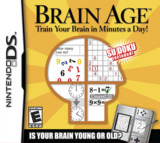Not an exceptionally amusing title, Brain Age is more of a collection of mind-puzzles than an actual game.
I try to avoid expressions of personal taste in reviews, so let me explain what the game actually consists of, as neutrally as I can, and I'll let you decide whether it sounds like something that suits your fancy.
There are several modes of play in Brain Age: Quick Play; Daily Training; Sudoku, and Download (Wireless multiplayer.) The main focus of the game is upon Daily Training, which itself has three modes; Brain Age Check, Training, and Graph.
Brain Age Check is itself the focus of the game, and the means by which the player "progresses" in achievements. The game works off the premise that our brains are at their sharpest and most creative at the age of 20 - therefore, the player is graded on a Brain Age scale that has its peak at 20, and moves "down" through the scale of age to what must be the grim dimwittedness of 80. (My roommate always scores around this level, to my infinite satisfaction.)
To determine the brain age, the player is put through a series of four randomly selected brain puzzles. These range from from a quick series of math problems to more complex puzzles, such as one wherein the player sees a color word displayed on the screen and must pronounce the color of the word itself. (For example, the word "Black" will appear in blue letters and the player must say, "Blue!")
The puzzles are varied, dealing with a range of issues from math to memory. Some are quite simple; for example, "Reading Aloud" displays a passage of a well known book which the player must read aloud as fast as he or she possibly can. Players must be content with just a few puzzles to start with, but using the game daily will be rewarded with the unlocking of puzzles. A total of ten puzzles can be accessed in this manner.
Another feature of the game is the Sudoku puzzle, which was something of a craze in the papers a while ago. For those of you unfamiliar with the concept, Sudoku is essentially a logic puzzle. The player is presented with a grid of 9 boxes, each of which is again subdivided into 9 boxes, and must fill this grid with numbers so that:
1) every line left to right and up to down contains the numbers one through nine.
2) every 3x3 box in the grid contains the numbers one through nine.
Its quite a complicated and challenging feature, and since the game provides a collection of about 60 puzzles, the player will likely go for a long time without exhausting this portion of Brain Age.
For every puzzle against the Sudoku, the player can be rated on a graph that marks his or her progress in the various puzzles over the course of time that he or she has played the game. If you have been diligent (or particularly masochistic) this can be a fairly informative experience.
Finally, there is the Download play. In this mode, 2 players may race to solve a 30 question Calculations Puzzle. Never, under any circumstances, suggest to play this game with your friends.
Brain Age is a well-produced game and does plenty of little things to keep the player engaged. The face of Dr. Kawashima constantly hovers on one screen shouting advice, instructions, and sometimes reveals little hidden aspects of the game, (for example, saying the word, "glasses" causes the doctor to do a little trick with his own.) The game uses both the microphone and the touchscreen to the extent that the player never touches the d-pad and buttons.
If you appreciate puzzles and the exercising of mental muscles, perhaps this is the game for you. However, one should not expect from this game the same type of enjoyment offered by such games as Tetris or Meteos. Brain Age puzzles are hard core, grim, logic-based games. They are not as flashy as any of the afore-mentioned games, have no bright colors, and are not accompanied by any distracting music. For those thinking of purchasing the original Brain Age, be aware that the main pleasure one will receive from the game may well be tracking how one has improved at a certain puzzle over time, rather than the experience of the puzzle itself.
I give Brain Age: Train Your Brain in Minutes A Day credit for its efforts to make what is an inherently dull concept into an interesting form of entertainment. I also respect the versatility of its gameplay, 10 unique puzzles are played using a combination of the microphone and touchscreen. In light of the dull nature of these puzzles, however, I found the game quickly became more work than play. In all probability most people could stand to gain from these mental exercises, but as a person who recommends games based off of the level of enjoyment I believe they will bring, I think people would better spend their money buying a cup of coffee and a subscription to the local newspaper.
I give it two and a half stars out of five.

